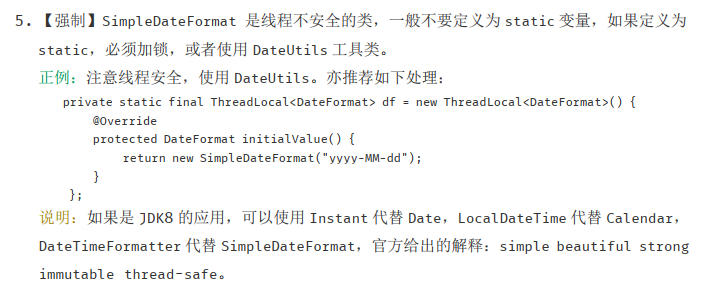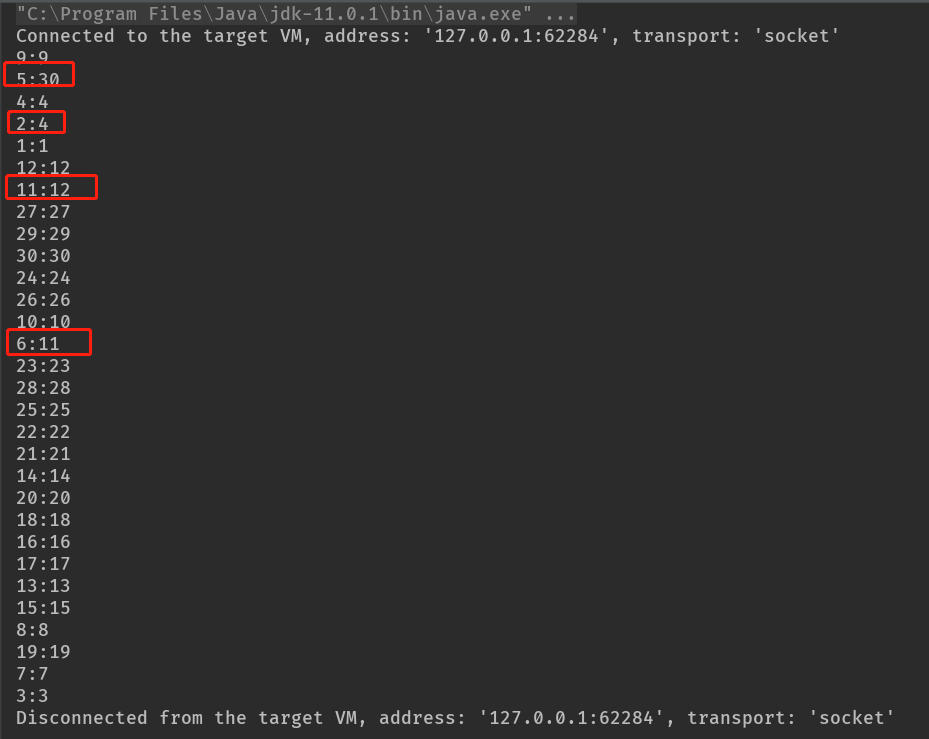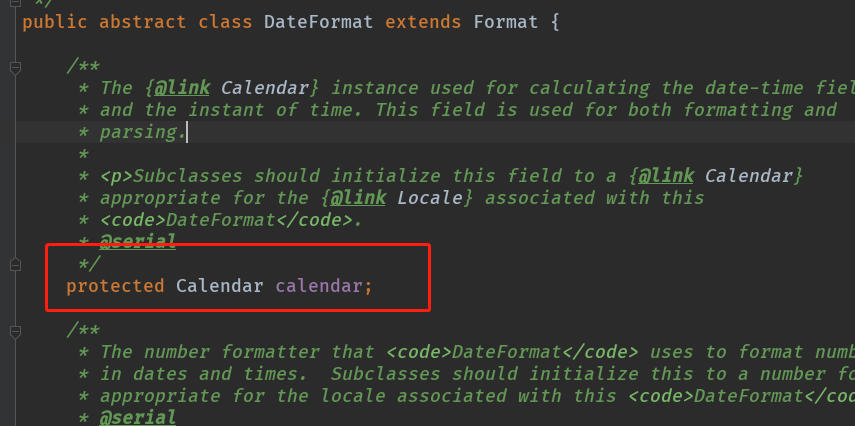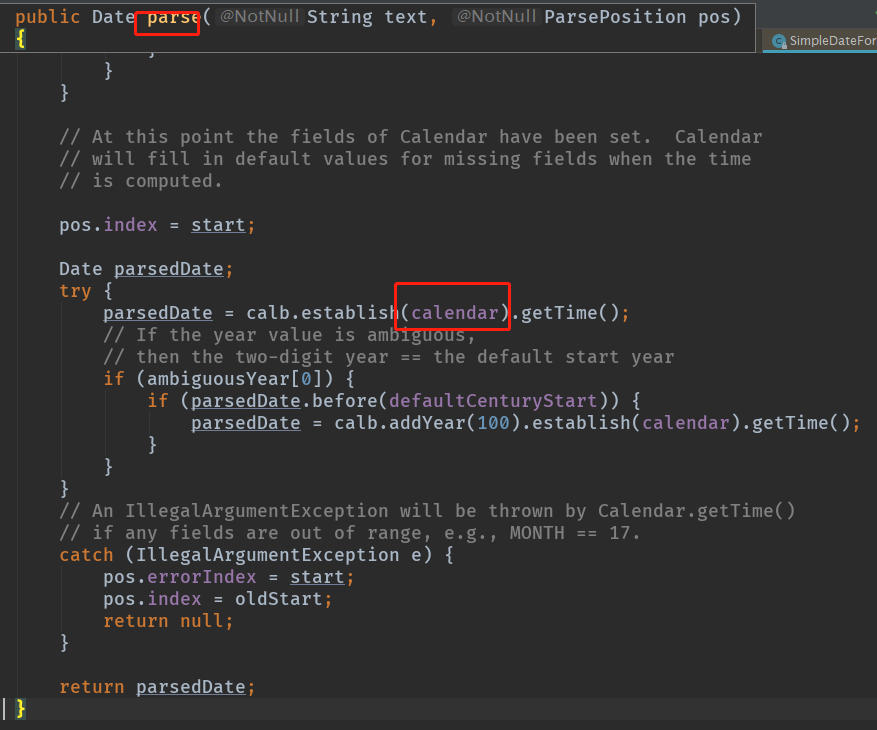为什么阿里Java规约要求谨慎使用SimpleDateFormat
在阿里Java开发规约中,有强制性的提到SimpleDateFormat 是线程不安全的类 ,在使用的时候应当注意线程安全问题,如下:

其实之前已经介绍过使用JDK1.8的DateTimeFormatter 和LocalDateTime来处理时间了, 还在用SimpleDateFormat?Java8都发布N年了,转LocalDateTime吧 。今天,就来说说SimpleDateFormat的线程安全问题。
SimpleDateFormat是非线程安全的
时间处理,基本所有项目上都是需要使用到的,往往很多初学者会把SimpleDateFormat定义为static类型,然后在进行时间转化的时候没有做加锁处理。如下:
public class Main {
private final static SimpleDateFormat SDFT = new SimpleDateFormat("yyyy-MM-dd HH:mm:ss");
public static void main(String[] args) throws ParseException {
System.out.println(SDFT.parse("2019-05-29 12:12:12"));
}
}
复制代码
当然,本代码直接运行是没有问题的。但是,当此SDFT实例应用到多线程环境下的时候,就会出现致命的问题。假设有如下代码:
public class Main {
private static SimpleDateFormat SDFT = new SimpleDateFormat("yyyy-MM-dd");
public static void main(String[] args) {
for (int i = 1; i < 31; i++) {
int ii = i;
new Thread(() -> {
Date date = null;
try {
String s = "2019-05-" + ii;
date = SDFT.parse(s);
System.out.println("" + ii + ":" + date.getDate());
} catch (ParseException e) {
e.printStackTrace();
}
}).start();
}
}
}
复制代码
此代码的意思是创建30个线程,去转化不同的时间字符串,然后做打印输出,运行结果:

(运行此代码也有可能出现由线程安全问题引起的异常)
根据“预期结果”,两边的数字应该是相等的,为何这里输出不相等呢?通过DateFormat源码可以查看:


因为SimpleDateFormat定义为了共享的,所以其类里的属性calendar也是多个线程共享的,这就造成了线程安全问题。
解决方案
方案一:加锁处理
如本文例子,可以通过加锁来保证线程安全:
public class Main {
private static SimpleDateFormat SDFT = new SimpleDateFormat("yyyy-MM-dd");
public static void main(String[] args) {
for (int i = 1; i < 31; i++) {
int ii = i;
new Thread(() -> {
Date date = null;
try {
String s = "2019-05-" + ii;
synchronized (Main.class) {
date = SDFT.parse(s);
}
System.out.println("" + ii + ":" + date.getDate());
} catch (ParseException e) {
e.printStackTrace();
}
}).start();
}
}
}
复制代码
输出:
4:4 3:3 1:1 2:2 29:29 28:28 27:27 26:26 30:30 25:25 23:23 21:21 20:20 22:22 18:18 24:24 19:19 17:17 16:16 14:14 15:15 12:12 13:13 10:10 11:11 9:9 7:7 6:6 5:5 8:8 复制代码
方案二:每次都创建SimpleDateFormat实例
代码改造如下:
public static void main(String[] args) {
for (int i = 1; i < 31; i++) {
int ii = i;
new Thread(() -> {
Date date = null;
try {
String s = "2019-05-" + ii;
date = new SimpleDateFormat("yyyy-MM-dd").parse(s);
System.out.println("" + ii + ":" + date.getDate());
} catch (ParseException e) {
e.printStackTrace();
}
}).start();
}
}
复制代码
每次使用SimpleDateFormat的时候,都去创建一个SimpleDateFormat实例,保证SimpleDateFormat实例不被共享。
方案三:使用LocalThread
这是阿里Java规约里提到的解决方法之一,之所以可以使用LocalThread来解决此问题,代码改造如下:
public class Main {
private static final ThreadLocal<SimpleDateFormat> threadLocal = new ThreadLocal<SimpleDateFormat>() {
@Override
protected SimpleDateFormat initialValue() {
return new SimpleDateFormat("yyyy-MM-dd");
}
};
public static void main(String[] args) {
for (int i = 1; i < 31; i++) {
int ii = i;
new Thread(() -> {
Date date = null;
try {
String s = "2019-05-" + ii;
date = threadLocal.get().parse(s);
System.out.println("" + ii + ":" + date.getDate());
} catch (ParseException e) {
e.printStackTrace();
}
}).start();
}
}
}
复制代码
运行结果如下:
22:22 2:2 24:24 15:15 17:17 16:16 29:29 9:9 30:30 3:3 4:4 5:5 12:12 8:8 20:20 26:26 21:21 28:28 19:19 27:27 18:18 1:1 14:14 25:25 11:11 13:13 7:7 6:6 23:23 10:10 复制代码
解决方法四:使用JDK1.8提供的DateTimeFormatter来处理时间,这里就不赘述了,可以参考我之前的文章。











![[HBLOG]公众号](https://www.liuhaihua.cn/img/qrcode_gzh.jpg)

